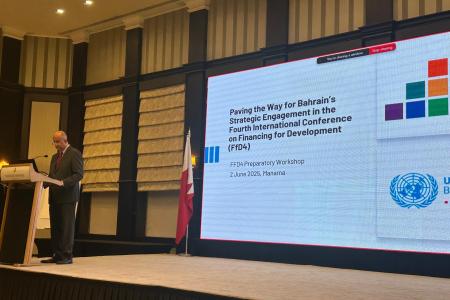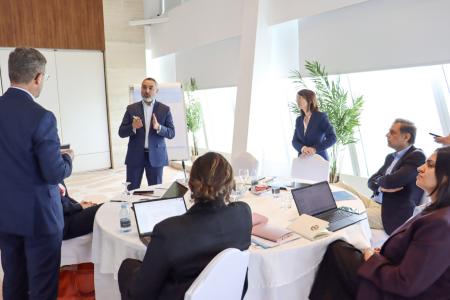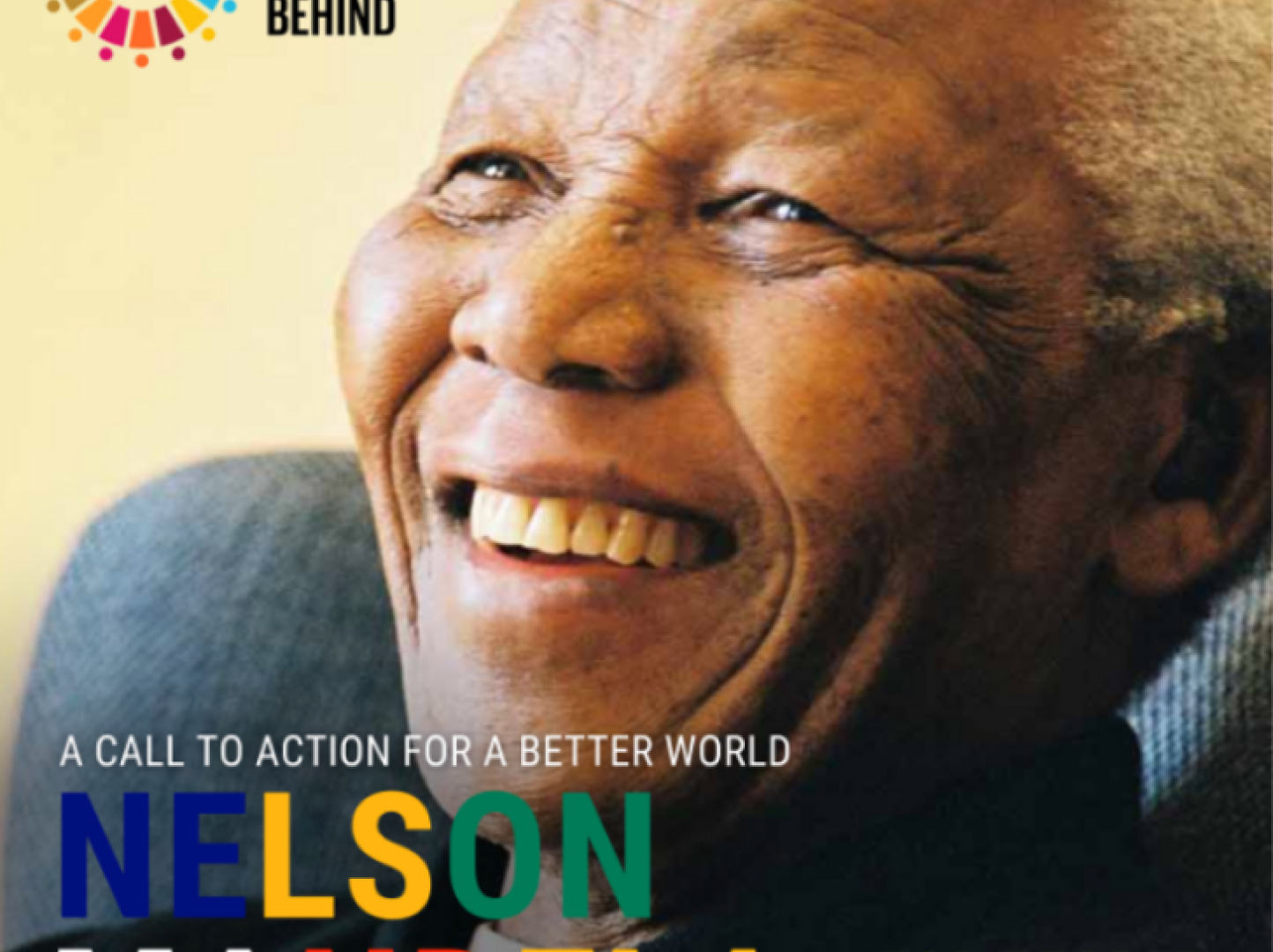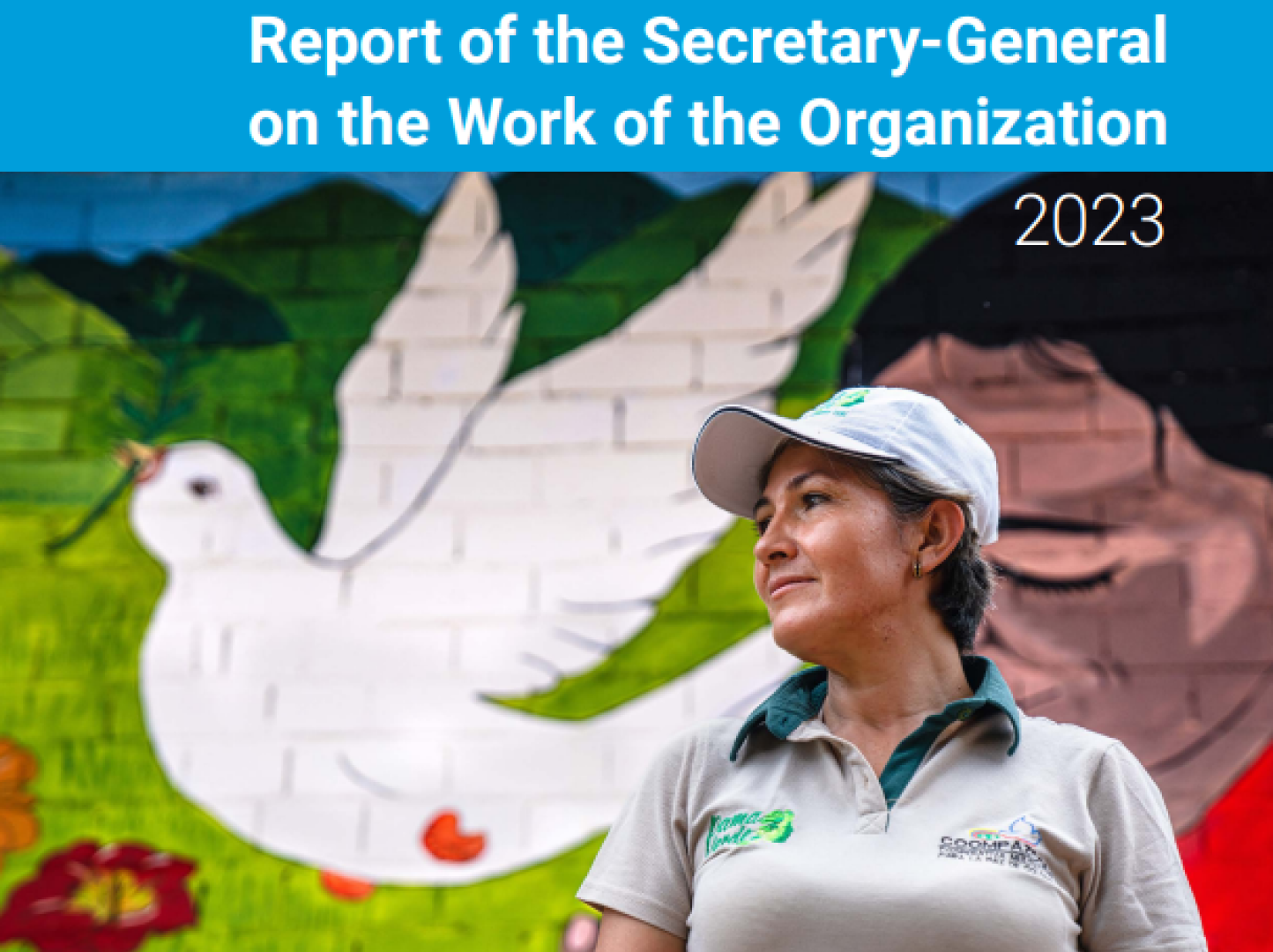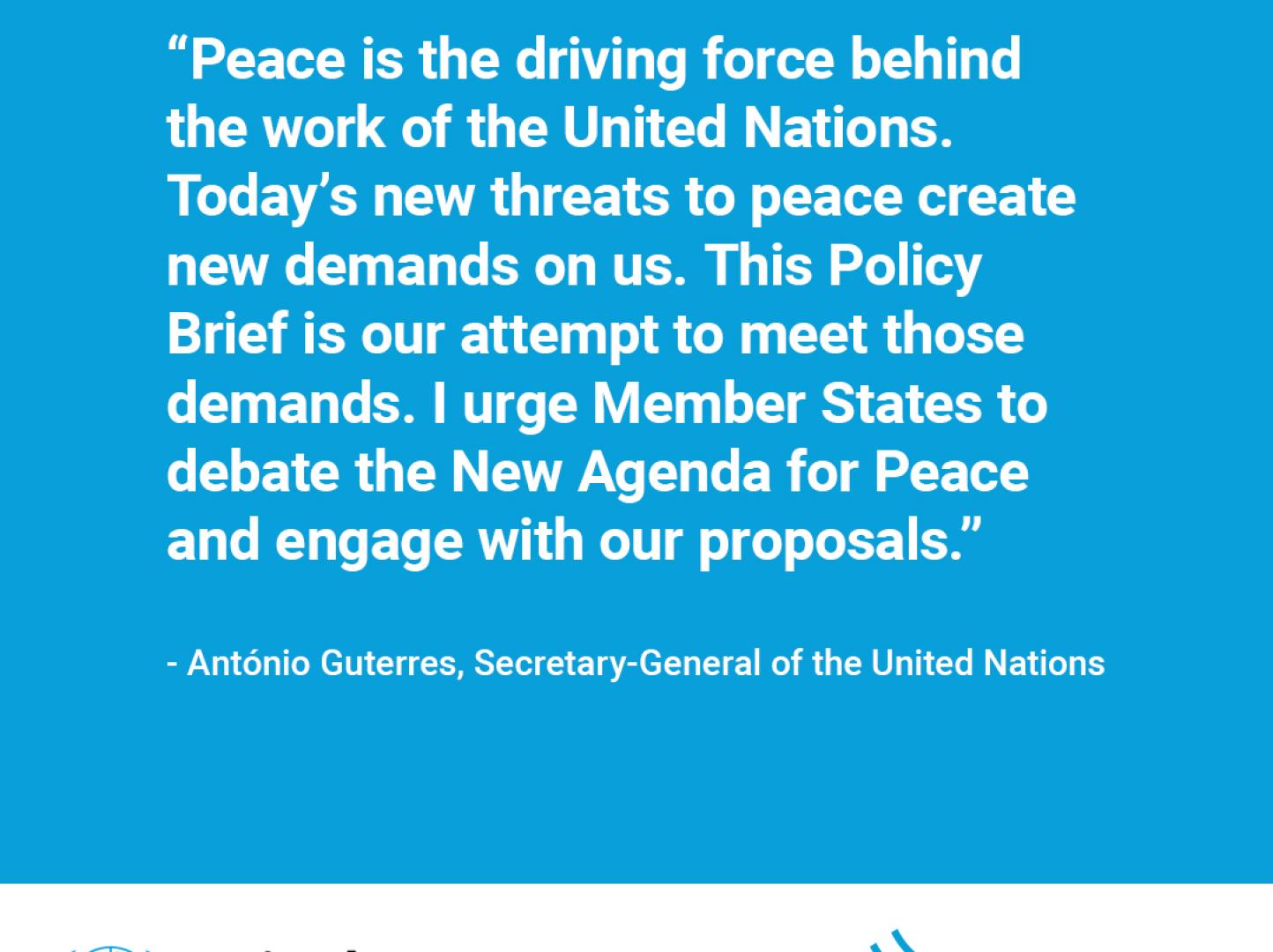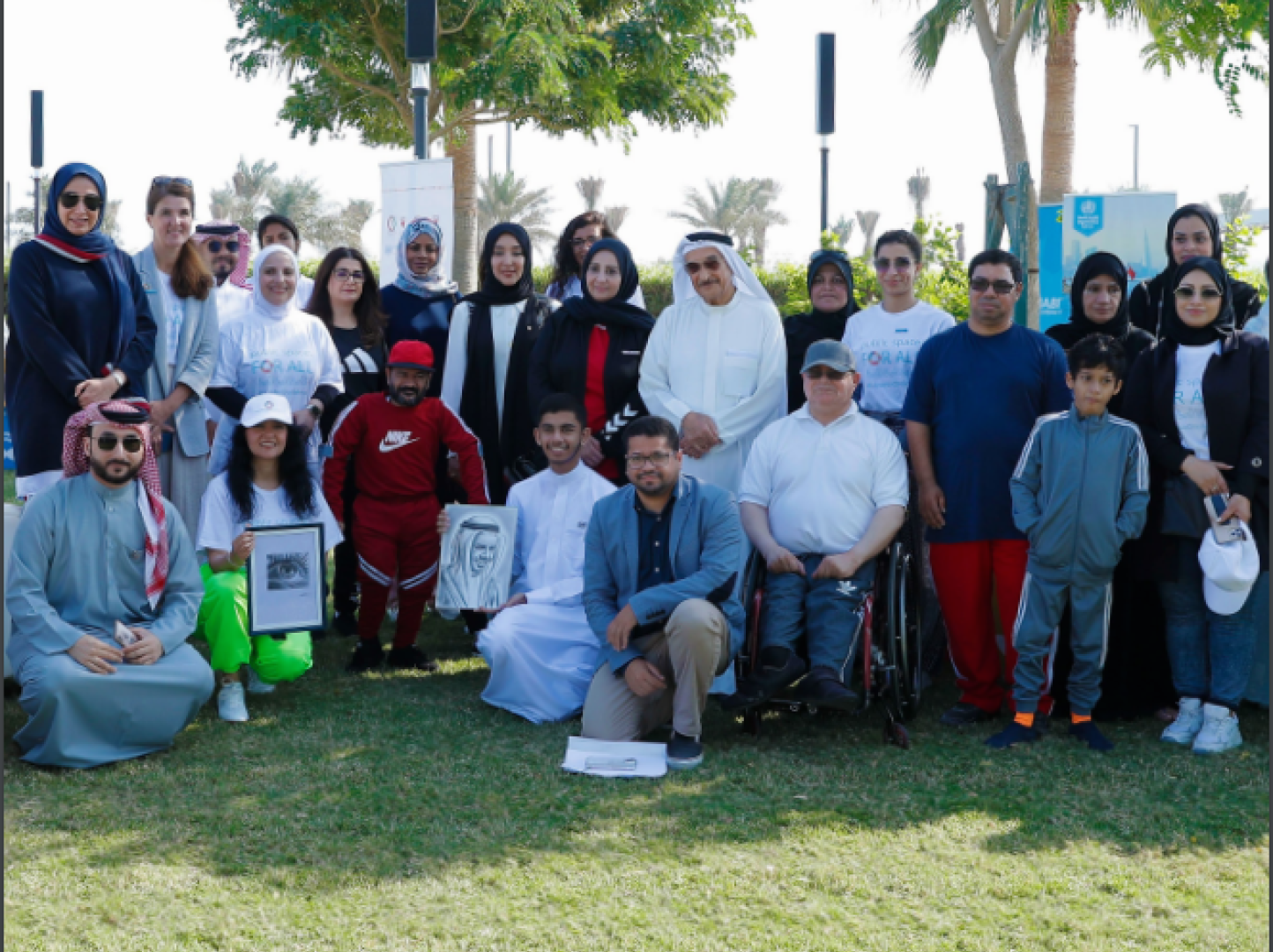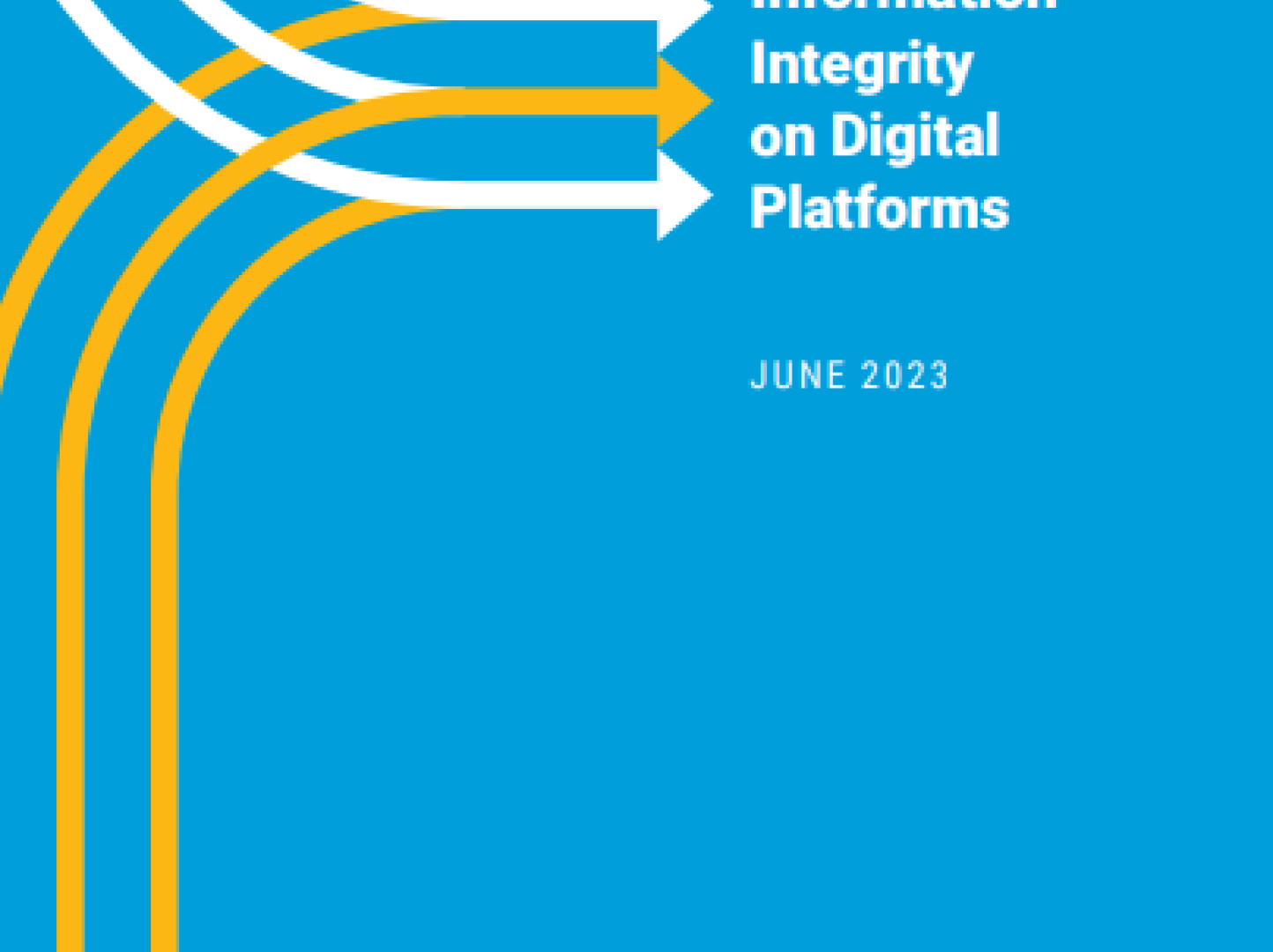آحدث المستجدات
بيان صحفي
٢٨ يناير ٢٠٢٦
بيان من المنسق المقيم للأمم المتحدة في البحرين، خالد المقود، بمناسبة اليوم الدولي للتعايش السلمي، الموافق 28 يناير 2026
لمعرفة المزيد
خطاب
٢٦ يناير ٢٠٢٦
رسالة الأمين العام للأمم المتحدة بمناسبة اليوم الدولي للطاقة النظيفة 2026
لمعرفة المزيد
خطاب
٢٤ يناير ٢٠٢٦
رسالة الأمين العام للأمم المتحدة بمناسبة اليوم الدولي للتعليم 2026
لمعرفة المزيد
آحدث المستجدات
أهداف التنمية المستدامة في البحرين
داف التنمية المستدامة هي دعوة عالمية للعمل من أجل القضاء على الفقر ، وحماية البيئة والمناخ، وضمان تمتع السكان في كل مكان بالسلام والازدهار. هذه هي الأهداف نفسها التي تعمل الأمم المتحدة عليها في البحرين:
قصة
٢٨ أغسطس ٢٠٢٥
التقرير السنوي 2024 للأمم المتحدة في البحرين يستعرض التقدم المحرز نحو تحقيق أهداف التنمية المستدامة
وتم تقديم التقرير للحكومة خلال اجتماع تم تنظيمه في مقر وزارة الخارجية. يُسلّط التقرير الضوء على الإنجازات الجماعية للأمم المتحدة في البحرين في مجالات التنمية الرئيسية. ومن أبرزها تعزيز دعم السياسات المتعلقة بالقدرة على التكيّف مع تغير المناخ، والمدن المستدامة والصحية، والتحول الأخضر الشامل. بالإضافة إلى ذلك، تم تعزيز مشاركة الشباب من خلال برامج التعليم والابتكار، وتوسيع نطاق المبادرات التي تُعزز القيادة النسائية ومشاركتهن في الاقتصاد، بالإضافة إلى تسريع الحلول الرقمية لتقديم الخدمات العامة والحوكمة. وصرح خالد المقداد، المنسق المقيم للأمم المتحدة في البحرين: "من خلال الشراكات الاستراتيجية مع حكومة البحرين والمجتمع المدني والقطاع الخاص، حقق فريق الأمم المتحدة القُطري نتائج تعكس التزام البلاد بالتنمية المستدامة والشاملة." وقال إن "هذا التقرير يمثل أكثر من مجرد توثيق لعملنا المشترك مع حكومة البحرين، بل هو شهادة على ما يمكن تحقيقه معا عندما نتحد حول أهداف مشتركة، كما يُظهر كيف تواصل منظومة الأمم المتحدة دعم رؤية البحرين 2030 وأولوياتها التنموية الوطنية." وباعتباره العام الختامي لإطار التعاون 2021-2024 بين الأمم المتحدة والبحرين، كان عام 2024 أيضًا عامًا للتحول والتطلع إلى المستقبل، تميز بتعزيز الإنجازات، وتفاعل رفيع المستوى بين الأمم المتحدة والبحرين، بالإضافة إلى مشاورات متعددة الأطراف أفضت إلى توقيع إطار تعاون جديد للبحرين للفترة 2025-2029 في 23 ديسمبر ديسمبر 2024.
1 / 5
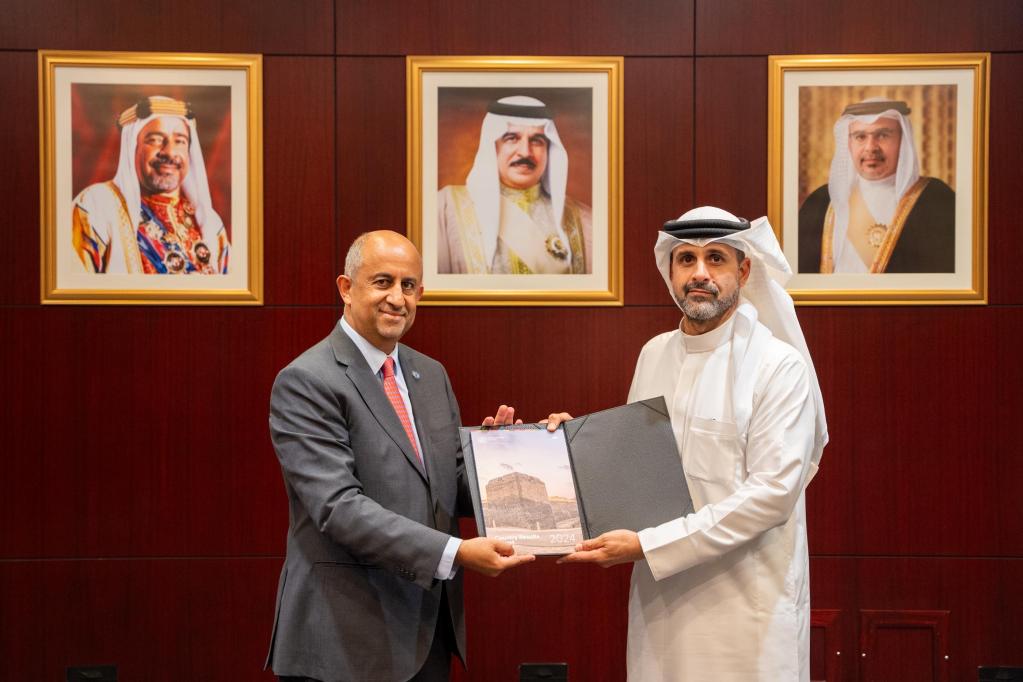
قصة
١٣ نوفمبر ٢٠٢٥
‘A wave of truth’: COP30 targets disinformation threat to climate action
By Felipe de Carvalho
Negotiators in Belém, Brazil, opened COP30 with a stark warning: the race to avert catastrophic global heating is being sabotaged by a surge of climate disinformation. The falsehoods, spreading faster than ever online, threaten to derail fragile progress on climate action.Brazil’s President Luiz Inácio Lula da Silva set the tone at the opening session, declaring that the battle for truth has become just as critical as the fight to cut emissions. COP30 must mark “a new defeat for climate denialists,” he said. On Wednesday, 12 nations – including Brazil, Canada, France, Germany and Spain – signed onto the first-ever Declaration on Information Integrity on Climate Change, pledging to fight back against the flood of false content and protect those on the frontlines of truth: environmental journalists, scientists and researchers.The declaration, unveiled under the Global Initiative for Information Integrity on Climate Change, calls for concrete steps to dismantle networks of climate lies and shield evidence-based voices from harassment and attacks.João Brant, Brazil’s Secretary for Digital Policies, said the goal is simple but urgent: to “create a wave of truth.”The initiative, launched in June, is a partnership between Brazil, the UN Department of Global Communications and UNESCO.Disinformation: a direct threat to COP30 Frederico Assis, COP30’s Special Envoy for Information Integrity, warned that the stakes could not be higher. “Disinformation, driven by obscurantist worldviews, fuels political extremism and puts lives at risk,” he told UN News, adding that there is a real danger of interference in climate negotiations.“There is broad recognition that disinformation can affect and compromise every part of the COP process – process diplomatic negotiations, the action agenda, or mobilization and summits. All our efforts will be at risk if we fail to tackle disinformation properly, which stems from denialism,” Mr. Assis said.He flagged the role of algorithms amplifying “conspiratorial and manipulative” content, often using “sophisticated tactics to spread false messages.” His mandate: keep the issue in the public eye and mobilize political, religious and social leaders, civil society and the media to push back. Cracking the code behind climate lies For the first time, information integrity has made it onto the official COP agenda – a milestone UNESCO’s Guilherme Canela says is long overdue.Speaking to UN News, Mr. Canela stressed that the global initiative aims to expose the machinery driving climate disinformation.“We still know very little about what’s behind this. For example, who funds these posts, and why do they spread faster than other types of content? How does that happen? If we don’t understand these mechanisms, it’s very difficult to design effective strategies to combat this phenomenon. The core of this global initiative is precisely to finance, especially in the Global South, investigative journalism and research projects to uncover what’s really happening,” he said.The Global Fund for Information Integrity on Climate Change, created under the initiative, has already attracted 447 proposals from nearly 100 countries. Backed by an initial $1 million from Brazil, the fund is supporting its first round of projects – almost two-thirds from developing nations.Mr. Canela called it “very rewarding” to see the issue “embraced so strongly at COP30.” Disinformation’s shape-shifting tactics Maria Clara Moraes, a UN Verified Champion and co-founder of the Marias Verdes platform, knows the battle well. With over half a million TikTok followers, she says the fight against climate disinformation is “completely possible, but also extremely challenging.”She warns that these campaigns are highly organized and “backed by powerful forces, particularly the fossil fuel industry.” Their narratives, she says, “change their disguise” over time.“There are several types of disinformation. One of the most powerful is saying that it’s too late – that nothing can be done, or that these events like COP30 don’t make a difference. That’s also disinformation. Saying, ‘This isn’t working, it’s too slow, too complex, too frustrating.’ But yes – it’s important. We must constantly reaffirm the value of multilateralism and the importance of spaces like this one,” she said. A generation that refuses to give up Despite the challenges, Ms. Moraes told us that she sees hope in younger generations. By producing content rooted in science and sustainability, she says awareness of the climate emergency is growing fast.According to her, young people are “a great source of hope and optimism.” She urges everyone to play their part in creating “micro-revolutions” through everyday choices that support climate action and drive systemic change.
Negotiators in Belém, Brazil, opened COP30 with a stark warning: the race to avert catastrophic global heating is being sabotaged by a surge of climate disinformation. The falsehoods, spreading faster than ever online, threaten to derail fragile progress on climate action.Brazil’s President Luiz Inácio Lula da Silva set the tone at the opening session, declaring that the battle for truth has become just as critical as the fight to cut emissions. COP30 must mark “a new defeat for climate denialists,” he said. On Wednesday, 12 nations – including Brazil, Canada, France, Germany and Spain – signed onto the first-ever Declaration on Information Integrity on Climate Change, pledging to fight back against the flood of false content and protect those on the frontlines of truth: environmental journalists, scientists and researchers.The declaration, unveiled under the Global Initiative for Information Integrity on Climate Change, calls for concrete steps to dismantle networks of climate lies and shield evidence-based voices from harassment and attacks.João Brant, Brazil’s Secretary for Digital Policies, said the goal is simple but urgent: to “create a wave of truth.”The initiative, launched in June, is a partnership between Brazil, the UN Department of Global Communications and UNESCO.Disinformation: a direct threat to COP30 Frederico Assis, COP30’s Special Envoy for Information Integrity, warned that the stakes could not be higher. “Disinformation, driven by obscurantist worldviews, fuels political extremism and puts lives at risk,” he told UN News, adding that there is a real danger of interference in climate negotiations.“There is broad recognition that disinformation can affect and compromise every part of the COP process – process diplomatic negotiations, the action agenda, or mobilization and summits. All our efforts will be at risk if we fail to tackle disinformation properly, which stems from denialism,” Mr. Assis said.He flagged the role of algorithms amplifying “conspiratorial and manipulative” content, often using “sophisticated tactics to spread false messages.” His mandate: keep the issue in the public eye and mobilize political, religious and social leaders, civil society and the media to push back. Cracking the code behind climate lies For the first time, information integrity has made it onto the official COP agenda – a milestone UNESCO’s Guilherme Canela says is long overdue.Speaking to UN News, Mr. Canela stressed that the global initiative aims to expose the machinery driving climate disinformation.“We still know very little about what’s behind this. For example, who funds these posts, and why do they spread faster than other types of content? How does that happen? If we don’t understand these mechanisms, it’s very difficult to design effective strategies to combat this phenomenon. The core of this global initiative is precisely to finance, especially in the Global South, investigative journalism and research projects to uncover what’s really happening,” he said.The Global Fund for Information Integrity on Climate Change, created under the initiative, has already attracted 447 proposals from nearly 100 countries. Backed by an initial $1 million from Brazil, the fund is supporting its first round of projects – almost two-thirds from developing nations.Mr. Canela called it “very rewarding” to see the issue “embraced so strongly at COP30.” Disinformation’s shape-shifting tactics Maria Clara Moraes, a UN Verified Champion and co-founder of the Marias Verdes platform, knows the battle well. With over half a million TikTok followers, she says the fight against climate disinformation is “completely possible, but also extremely challenging.”She warns that these campaigns are highly organized and “backed by powerful forces, particularly the fossil fuel industry.” Their narratives, she says, “change their disguise” over time.“There are several types of disinformation. One of the most powerful is saying that it’s too late – that nothing can be done, or that these events like COP30 don’t make a difference. That’s also disinformation. Saying, ‘This isn’t working, it’s too slow, too complex, too frustrating.’ But yes – it’s important. We must constantly reaffirm the value of multilateralism and the importance of spaces like this one,” she said. A generation that refuses to give up Despite the challenges, Ms. Moraes told us that she sees hope in younger generations. By producing content rooted in science and sustainability, she says awareness of the climate emergency is growing fast.According to her, young people are “a great source of hope and optimism.” She urges everyone to play their part in creating “micro-revolutions” through everyday choices that support climate action and drive systemic change.
1 / 5

قصة
٠٢ أكتوبر ٢٠٢٥
Arab States advance regional action through first coordination meeting on marine disaster risk reduction
Alexandria, Egypt - 30 June 2025 - Representatives from 15 Arab states, regional organizations, and international partners convened from 28 to 30 June at the Arab Academy for Science, Technology and Maritime Transport (AASTMT) in Abu Qir for the First Coordination Meeting of the Arab Programme for Reducing Marine Disasters.Organized under the auspices of the League of Arab States, hosted by AASTMT, and with active participation and facilitation by the United Nations Office for Disaster Risk Reduction, Regional Office for the Arab States (UNDRR ROAS), the three-day meeting marked a significant step towards operationalizing the Arab Strategy for Disaster Risk Reduction by establishing a coordinated regional programme to address marine disaster risks and by finalizing the draft concept note for the Arab Programme for Marine DRR.Strengthening regional capacities and coordination
The meeting opened with remarks from H.E. Prof. Dr. Ismail Abdel Ghaffar, President of AASTMT, who emphasized:"This meeting reflects the Academy's commitment to its role as an Arab centre of excellence in maritime transport and logistics. Marine disaster risk reduction is at the top of our priorities, recognizing its importance amid growing environmental and navigational challenges facing Arab countries."He added:"We seek to be an active partner in implementing the Arab Programme for Reducing Marine Disasters by strengthening cooperation with international and regional organizations, exchanging expertise, and building specialized technical capacities."H.E. Minister Plenipotentiary Dr. Mahmoud Reda Fathallah, Director at the League of Arab States, stated:"The League attaches increasing importance to disaster risk reduction and works through its specialized bodies to coordinate Arab efforts to enhance member states' capacities to deal with natural and man-made risks."He highlighted:"This meeting is an important step towards building an effective Arab roadmap to reduce marine disasters in cooperation with development partners and relevant organizations."The opening session was also addressed by H.E. Ambassador Ali Abdi, Ambassador of Somalia in Egypt and Permanent Representative to the League of Arab States, alongside senior officials from ministries of foreign affairs, interior, and transport.Key outcomes
Participants engaged in four thematic sessions, including:Development and finalization of the Arab Programme for Reducing Marine Disasters Concept and the 2025-2027 Action Plan, defining the programme's strategic vision, objectives, and priority actions to build safer coastal communities.
Presentations on global and regional marine disaster risk reduction efforts, covering policies, technologies, and multi-stakeholder partnerships to strengthen preparedness and response.
Sharing of national experiences and lessons learned from Arab states to enhance mutual learning and identify scalable solutions.
Identification of regional priorities, capacity-building needs, and coordination mechanisms to advance joint action under the Arab Strategy for Disaster Risk Reduction.
Participants also conducted technical field visits to AASTMT's Integrated Simulation Complex, Planetarium, Maritime Safety Institute, and College of Maritime Transport and Technology simulators, gaining insights into cutting-edge technologies that strengthen preparedness, response, and maritime safety training capacities.Towards a safer marine environment
The Arab Programme for Reducing Marine Disasters (2025-2030) aims to:Establish a joint operational framework for preparedness, response, and recovery.
Enhance early warning systems and preventive measures aligned with international standards.
Strengthen emergency response capacities at national and regional levels.
Promote protection of marine environments and biodiversity.
Facilitate knowledge exchange and capacity building among Arab states.
Advance regional and international cooperation to build marine disaster resilience.
Editors' recommendations
Nature-based solutions for comprehensive disaster and climate risk management: Toolkit for integrated planning and implementation of disaster risk reduction and climate change adaptation
Water risks and resilience
Facing the heat: how the Arab Region is tackling rising temperatures
Returning to our roots: the value of ancestral knowledge in facing future challenges
The meeting opened with remarks from H.E. Prof. Dr. Ismail Abdel Ghaffar, President of AASTMT, who emphasized:"This meeting reflects the Academy's commitment to its role as an Arab centre of excellence in maritime transport and logistics. Marine disaster risk reduction is at the top of our priorities, recognizing its importance amid growing environmental and navigational challenges facing Arab countries."He added:"We seek to be an active partner in implementing the Arab Programme for Reducing Marine Disasters by strengthening cooperation with international and regional organizations, exchanging expertise, and building specialized technical capacities."H.E. Minister Plenipotentiary Dr. Mahmoud Reda Fathallah, Director at the League of Arab States, stated:"The League attaches increasing importance to disaster risk reduction and works through its specialized bodies to coordinate Arab efforts to enhance member states' capacities to deal with natural and man-made risks."He highlighted:"This meeting is an important step towards building an effective Arab roadmap to reduce marine disasters in cooperation with development partners and relevant organizations."The opening session was also addressed by H.E. Ambassador Ali Abdi, Ambassador of Somalia in Egypt and Permanent Representative to the League of Arab States, alongside senior officials from ministries of foreign affairs, interior, and transport.Key outcomes
Participants engaged in four thematic sessions, including:Development and finalization of the Arab Programme for Reducing Marine Disasters Concept and the 2025-2027 Action Plan, defining the programme's strategic vision, objectives, and priority actions to build safer coastal communities.
Presentations on global and regional marine disaster risk reduction efforts, covering policies, technologies, and multi-stakeholder partnerships to strengthen preparedness and response.
Sharing of national experiences and lessons learned from Arab states to enhance mutual learning and identify scalable solutions.
Identification of regional priorities, capacity-building needs, and coordination mechanisms to advance joint action under the Arab Strategy for Disaster Risk Reduction.
Participants also conducted technical field visits to AASTMT's Integrated Simulation Complex, Planetarium, Maritime Safety Institute, and College of Maritime Transport and Technology simulators, gaining insights into cutting-edge technologies that strengthen preparedness, response, and maritime safety training capacities.Towards a safer marine environment
The Arab Programme for Reducing Marine Disasters (2025-2030) aims to:Establish a joint operational framework for preparedness, response, and recovery.
Enhance early warning systems and preventive measures aligned with international standards.
Strengthen emergency response capacities at national and regional levels.
Promote protection of marine environments and biodiversity.
Facilitate knowledge exchange and capacity building among Arab states.
Advance regional and international cooperation to build marine disaster resilience.
Editors' recommendations
Nature-based solutions for comprehensive disaster and climate risk management: Toolkit for integrated planning and implementation of disaster risk reduction and climate change adaptation
Water risks and resilience
Facing the heat: how the Arab Region is tackling rising temperatures
Returning to our roots: the value of ancestral knowledge in facing future challenges
1 / 5

قصة
٠١ أكتوبر ٢٠٢٥
Digitalization and artificial intelligence promise to boost jobs in the Arab States – but they must be managed inclusively
BEIRUT (ILO News) – A new report by the International Labour Organization (ILO) projects that digitalization and artificial intelligence (AI) will have an overall positive impact on jobs and growth in the Arab States region if supported by effective investments and policy measures. The report also highlights the need for countries to adopt inclusive policies that leave no one behind in the transition to a digital economy.
The report, Navigating the digital and artificial intelligence revolution in Arab labour markets: Trends, challenges and opportunities, highlights that nearly 14.6 per cent of jobs (almost 8 million) could benefit from AI-driven augmentation, where technology enhances rather than replaces human work. By contrast, around 2.2 per cent of jobs (around 1.2 million) across the region are potentially at risk of being automatable with generative AI.
The report finds that by 2035, AI integration could generate US$14.1 billion in additional GDP and lead to a net creation of 118,000 additional jobs across the region. But digitalization and AI will affect sectors unevenly. Sectors such as construction, transport and storage, teaching, personal services and engineering are expected to see net gains, while jobs in public services, basic manufacturing, retail and routine clerical work may decline.
“Digitalization and AI adoption in the labour market do not have to imply job destruction in the Arab States region,” said ILO Regional Director for Arab States Ruba Jaradat. “While some jobs will be lost, others will be augmented or newly created. The real benefits of AI and digitalization, however, can only be realized if governments, employers and workers take deliberate steps to make the transition inclusive and fair. This report is an important resource for policymakers, providing evidence, data and recommendations that can help the region prepare for the digital future of work and ensure that technological progress translates into more and better jobs and opportunities for all.”
The study highlights sharp disparities across demographic groups. Women hold more than three times the share of jobs at risk of automation due to generative AI (5.3 per cent) compared to men (1.6 per cent), reflecting women’s concentration in routine clerical roles. Yet they also stand to benefit the most from augmentation, with 22.7 per cent of female-held jobs potentially enhanced by generative AI technologies compared to 13 per cent of male-held jobs. Importantly, even after accounting for the job creation potential of AI and digital technologies, women are projected to face fewer job opportunities by 2035 unless policies are deliberately designed to address gender inequalities and actively promote women’s employment.
Youth aged 15–24 are more likely to benefit from AI adoption, particularly in new tech-driven occupations, while older workers aged over 55 face greater risks of exclusion due to reskilling challenges. Other groups such as low-skilled workers, migrants, refugees and persons with disabilities also risk being left behind without targeted support.
The report stresses that the outcome of digital transformation will depend heavily on policy choices. Governments must invest in digital infrastructure and narrow the digital divide, especially in rural and conflict-affected areas. At the same time, they need to build a digitally skilled workforce by embedding digital literacy and lifelong learning, as well as science, technology, engineering and mathematics (STEM) subjects into education and training systems.
Robust social protection and employment services are also critical to help workers adapt to technological disruption, while micro, small and medium-sized enterprises must be supported to adopt digital tools and benefit from AI. The report also urges countries to update labour laws and regulations to protect workers in the digital economy, including platform and gig workers, while ensuring that strategies are developed through social dialogue among governments, employers and workers. Finally, the ILO calls for stronger regional and international cooperation to reduce disparities in digital readiness and align national strategies with global standards.
The report’s findings will guide ILO support to governments and social partners in navigating the digital transformation of work. They will serve as a foundation for developing and implementing regional, national and sectoral strategies that translate into tangible labour market and employment outcomes.
The report covers the Arab States of the Gulf and the Levant: Bahrain, Iraq, Jordan, Kuwait, Lebanon, Oman, Qatar, Saudi Arabia, the State of Palestine, Syria, the United Arab Emirates and Yemen. It provides an in-depth regional view that underpins the ILO’s global work on the world-of-work dimensions of AI and the digital economy through its Observatory on AI and Work in the Digital Economy.
The report, Navigating the digital and artificial intelligence revolution in Arab labour markets: Trends, challenges and opportunities, highlights that nearly 14.6 per cent of jobs (almost 8 million) could benefit from AI-driven augmentation, where technology enhances rather than replaces human work. By contrast, around 2.2 per cent of jobs (around 1.2 million) across the region are potentially at risk of being automatable with generative AI.
The report finds that by 2035, AI integration could generate US$14.1 billion in additional GDP and lead to a net creation of 118,000 additional jobs across the region. But digitalization and AI will affect sectors unevenly. Sectors such as construction, transport and storage, teaching, personal services and engineering are expected to see net gains, while jobs in public services, basic manufacturing, retail and routine clerical work may decline.
“Digitalization and AI adoption in the labour market do not have to imply job destruction in the Arab States region,” said ILO Regional Director for Arab States Ruba Jaradat. “While some jobs will be lost, others will be augmented or newly created. The real benefits of AI and digitalization, however, can only be realized if governments, employers and workers take deliberate steps to make the transition inclusive and fair. This report is an important resource for policymakers, providing evidence, data and recommendations that can help the region prepare for the digital future of work and ensure that technological progress translates into more and better jobs and opportunities for all.”
The study highlights sharp disparities across demographic groups. Women hold more than three times the share of jobs at risk of automation due to generative AI (5.3 per cent) compared to men (1.6 per cent), reflecting women’s concentration in routine clerical roles. Yet they also stand to benefit the most from augmentation, with 22.7 per cent of female-held jobs potentially enhanced by generative AI technologies compared to 13 per cent of male-held jobs. Importantly, even after accounting for the job creation potential of AI and digital technologies, women are projected to face fewer job opportunities by 2035 unless policies are deliberately designed to address gender inequalities and actively promote women’s employment.
Youth aged 15–24 are more likely to benefit from AI adoption, particularly in new tech-driven occupations, while older workers aged over 55 face greater risks of exclusion due to reskilling challenges. Other groups such as low-skilled workers, migrants, refugees and persons with disabilities also risk being left behind without targeted support.
The report stresses that the outcome of digital transformation will depend heavily on policy choices. Governments must invest in digital infrastructure and narrow the digital divide, especially in rural and conflict-affected areas. At the same time, they need to build a digitally skilled workforce by embedding digital literacy and lifelong learning, as well as science, technology, engineering and mathematics (STEM) subjects into education and training systems.
Robust social protection and employment services are also critical to help workers adapt to technological disruption, while micro, small and medium-sized enterprises must be supported to adopt digital tools and benefit from AI. The report also urges countries to update labour laws and regulations to protect workers in the digital economy, including platform and gig workers, while ensuring that strategies are developed through social dialogue among governments, employers and workers. Finally, the ILO calls for stronger regional and international cooperation to reduce disparities in digital readiness and align national strategies with global standards.
The report’s findings will guide ILO support to governments and social partners in navigating the digital transformation of work. They will serve as a foundation for developing and implementing regional, national and sectoral strategies that translate into tangible labour market and employment outcomes.
The report covers the Arab States of the Gulf and the Levant: Bahrain, Iraq, Jordan, Kuwait, Lebanon, Oman, Qatar, Saudi Arabia, the State of Palestine, Syria, the United Arab Emirates and Yemen. It provides an in-depth regional view that underpins the ILO’s global work on the world-of-work dimensions of AI and the digital economy through its Observatory on AI and Work in the Digital Economy.
1 / 5

قصة
٢٤ نوفمبر ٢٠٢٤
الفريق المعني بالنوع الاجتماعي التابع للفريق القطري للأمم المتحدة في البحرين يضع استراتيجية 2025 للنهوض بأهداف المساواة بين الجنسين
يقود الفريق المعني بالنوع الاجتماعي التابع للفريق القطري للأمم المتحدة في البحرين منذ تأسيسه في عام 2023 الجهود الرامية إلى تعزيز تعميم مراعاة منظور النوع الاجتماعي في جميع أعمال الأمم المتحدة في البحرين. والتزاماً بتحقيق نتائج ملموسة للنساء والفتيات، عقد الفريق مؤخراً معتكفاً استراتيجياً لمدة يومين لمراجعة الإنجازات وتحديد الأولويات الطموحة لعام 2025.وقد قادت هيئة الأمم المتحدة للمرأة وصندوق الأمم المتحدة للسكان، بصفتهما الرئيسين المشاركين للفريق المعني بالنوع الاجتماعي، المعتكف بمشاركة برنامج الأمم المتحدة للمستوطنات البشرية، ومفوضية الأمم المتحدة لحقوق الإنسان، والمنظمة الدولية للهجرة، ومركز الأمم المتحدة للإعلام، ومنظمة الصحة العالمية، وبدعم من مكتب المنسق المقيم للأمم المتحدة في البحرين.وبدأ المعتكف باستعراض تنفيذ خطة عمل الفريق المعني بالنوع الاجتماعي لعام 2024 والتقدم المحرز في سجل أداء خطة العمل على نطاق فريق الأمم المتحدة القطري بشأن المساواة بين الجنسين. وقامت المجموعة بتقييم خطة العمل السنوية لتحديد التقدم المحرز في إدماج منظور النوع الاجتماعي في العمل المشترك لفريق الأمم المتحدة القطري. واستناداً إلى هذا التقدم، صاغ الفريق المعني بالنوع الاجتماعي التقرير السنوي لبطاقة الأداء، واختار خمسة مؤشرات أداء لإظهار التحسينات في الجهود الجماعية لفريق الأمم المتحدة القطري في مجال المساواة بين الجنسين. وخلال المعتكف، قدمت هيئة الأمم المتحدة للمرأة دراسة الفريق المعني بالنوع الاجتماعي التي أجريت هذا العام لحساب مساهمة وقت الموظفين الأعضاء في الفريق، والتي قدمت توصيات رئيسية لتعزيز قدرة الفريق على تحقيق نتائج في مجال النوع الاجتماعي في العمل المشترك لفريق الأمم المتحدة القطري. وبالاعتماد على نتائج الدراسة وغيرها من الرؤى، وضع الفريق القطري المعني للنوع الاجتماعي إجراءات رئيسية لإدراجها في خطة عمل الفريق لعام 2025.وفي اليوم الثاني، قامت هيئة الأمم المتحدة للمرأة بتيسير جلسات بناء القدرات لدعم الفريق المعني بالنوع الاجتماعي في تنفيذ خطة عمله بما يتماشى مع المعايير والإجراءات العالمية للمجموعات المعنية بالنوع الاجتماعي. وشمل التدريب تجديد المعلومات حول مؤشر المساواة بين الجنسين، وهي أداة لتقييم تخصيص الموارد في الأنشطة في خطة العمل المشتركة لفريق الأمم المتحدة القطري التي تعزز المساواة بين الجنسين. وأعقبت ذلك جلسة تمهيدية حول تعميم مراعاة المنظور الجنساني، حيث قدمت إرشادات حول كيفية قيام وكالات الأمم المتحدة بإدماج منظور المساواة بين الجنسين بشكل أكثر فعالية في برامجها. بالإضافة إلى ذلك، عُقدت جلسة حول رصد النتائج القائمة على النوع الاجتماعي والإبلاغ عنها لدراسة هيكل الرصد المراعي لمنظور النوع الاجتماعي واستكشاف الأساليب العملية لإدراج قياس التغييرات المتعلقة بالنوع الاجتماعي في المؤشرات.وعزز هذا المعتكف دور الفريق المعني بالمساواة بين الجنسين في تعزيز المساءلة وبناء القدرات للبرمجة المستجيبة للنوع الاجتماعي داخل فريق الأمم المتحدة القطري. ومع استمرار البحرين في النهوض بالمساواة بين الجنسين بما يتماشى مع الهدف الخامس من أهداف التنمية المستدامة، يظل الفريق العالمي للنوع الاجتماعي ملتزمًا بتحقيق نتائج متماسكة وتحويلية للنساء والفتيات، مما يساهم في تحقيق أهداف التنمية المستدامة على نطاق أوسع.وقالت جوزفين موس، الرئيسة المشاركة للفريق المعني بالنوع الاجتماعي وأخصائية التنسيق الإقليمي من المكتب الإقليمي لهيئة الأمم المتحدة للمرأة للدول العربية إنه”بناءً على إنجازات هذا العام، سيعمل الفريق المعني بالنوع الاجتماعي على أن تظل المساواة بين الجنسين وتمكين المرأة في صميم العمل المشترك لفريق الأمم المتحدة القطري في البحرين مدعومًا بالتدريب الفني الذي تم إجراؤه خلال المعتكف. وستضمن الجهود الجماعية التي يبذلها الفريق المعني بالنوع الاجتماعي أن يكون فريق الأمم المتحدة القطري قادرًا على التعاون بفعالية مع شركائنا الوطنيين والمساهمة في أولويات التنمية الوطنية لمملكة البحرين فيما يتعلق بتمكين المرأة ومنهاج عمل بكين.“ ومع وجود خارطة طريق واضحة لعام 2025، يستعد الفريق المعني بالنوع الاجتماعي لتعزيز تأثيره في مجال المساواة بين الجنسين، وضمان أن يظل عمل الأمم المتحدة في البحرين شاملاً وفعالاً ومتوافقاً مع المعايير العالمية.
1 / 5
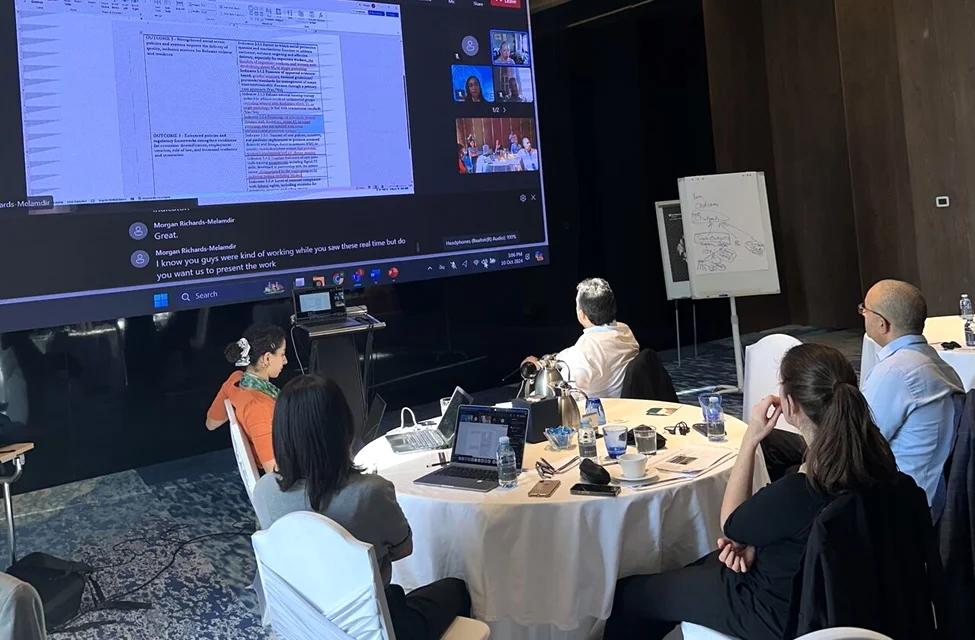
قصة
٢١ يناير ٢٠٢٦
وكالات أممية تحذر: الذكاء الاصطناعي قد يعزز حقوق الأطفال أو ينتهكها
جاء ذلك في بيان مشترك صدر عن مجموعة من الوكالات الأممية، من بينها الاتحاد الدولي للاتصالات واليونيسف ومكتب الأمم المتحدة لحقوق الإنسان، إلى جانب لجنة حقوق الطفل.شدد البيان على الحاجة الملحة إلى اعتماد نهج قائم على حقوق الطفل في كل مراحل تطوير الذكاء الاصطناعي واستخدامه وحوكمته.وأكد أن التطور السريع للتقنيات الرقمية والذكاء الاصطناعي يغير حياة الأطفال اليوم ومستقبلهم، كما أنه يوفر فرصا غير مسبوقة للتعلم والمشاركة والوصول إلى الخدمات. لكنه في المقابل قد يخلق تحديات خطيرة، سواء من خلال تفاعل الأطفال المباشر مع أنظمة الذكاء الاصطناعي، أو عبر آثار غير مباشرة تمس حياتهم وحقوقهم دون أن يكونوا طرفا فيها.وأشار البيان إلى أن معظم أدوات الذكاء الاصطناعي الحالية لم تُصمم أصلا مع مراعاة احتياجات الأطفال أو سلامتهم، محذرين من نقص الوعي والتدريب، ليس فقط لدى الأطفال وأسرهم، بل أيضا لدى المعلمين وصناع السياسات والمطورين أنفسهم. كما لفت إلى ضعف الثقافة الرقمية والذكاء الاصطناعي، مما يزيد هشاشة الأطفال في الفضاء الرقمي.ودعا البيان الدول الأطراف في اتفاقية حقوق الطفل إلى اتخاذ إجراءات تشريعية وإدارية واضحة لضمان حوكمة فعالة للذكاء الاصطناعي، تشمل آليات شفافة للرصد والمساءلة، وتخصيص موارد كافية لحماية الأطفال في البيئة الرقمية. كما شدد على ضرورة أن تكون التقييمات مفهومة ومتاحة للأطفال أنفسهم، وبأسلوب يتناسب مع أعمارهم.وفيما يتعلق بدور شركات التكنولوجيا، أكد البيان أن مسؤولية احترام حقوق الطفل لا تقل أهمية عن الابتكار التقني. وطالب الشركات بإجراء مراجعات دورية لأنظمتها، وضمان الشفافية حول كيفية عمل خوارزمياتها، ومنع استهداف الأطفال بمحتوى ضار أو غير قانوني، أو استغلال بياناتهم لأغراض تجارية أو تدريب نماذج الذكاء الاصطناعي دون موافقة واضحة.كما خصص البيان حيزا واسعا لمسألة سلامة الأطفال، محذرا من استخدام الذكاء الاصطناعي في إنتاج أو نشر محتوى عنيف أو مضلل، بما في ذلك التزييف العميق، والتنمر الإلكتروني، والاستغلال الجنسي، وخطاب الكراهية. ودعا إلى تجريم هذه الانتهاكات والتحقيق فيها، مع توفير آليات إبلاغ آمنة وسرية تراعي احتياجات الأطفال.
1 / 5

قصة
١١ يناير ٢٠٢٦
المركز الدولي لريادة الأعمال: الصناعات الصغيرة والمتوسطة مفتاح تحقيق التنمية
الشيخ إبراهيم بن خليفة يرى أنه "لا يمكن تصور أن تكون هناك تنمية للمجتمعات دون دخول تلك الصناعات كفاعل أساسي". هذه الرؤية كانت جلية أثناء لقائنا معه في قلب العاصمة السعودية الرياض، خلال فعاليات الدورة الـ 21 للمؤتمر العام لمنظمة الأمم المتحدة للتنمية الصناعية (اليونيدو) والذي أقيم تحت مسمى "القمة العالمية للصناعة".لكن استدامة تلك الصناعات الصغيرة والمتوسطة ومتناهية الصغر "يحتاج إلى قدر كبير من التطوير والإبداع والاختراعات"، كما أوضح لنا بن خليفة.مبادرات وتعليم متطوريتعاون المركز الدولي لريادة الأعمال والابتكار في البحرين مع مكتب ترويج الاستثمار والتكنولوجيا التابع لليونيدو في المنامة. وأوضح رئيس مجلس الأمناء في المركز أن مبادراتهم تركز على ريادة الأعمال في قطاعات الزراعة والتكنولوجيا، فضلا عن التعليم، الذي يرى أنه "مهم للغاية، ولم يعد كما كان"، مشددا على أهمية التطوير في هذا المجال لمواكبته.وشدد كذلك على أهمية تطوير سلسلة التصنيع، وألا يكون الاعتماد فقط على تصدير المواد الأولية، مضيفا: "لا نريد أن نبقى سوقا مستهلكا فقط".وأكد أن السوق مفتوح في هذا المجال والقوى العاملة موجودة، وما يتبقى هو التدريب والخدمات المساندة.بناء اقتصادي متغيروفي سبيل العمل نحو تحقيق تلك الأهداف، لفت بن خليفة أيضا إلى التحولات التي يشهدها العالم حاليا، حيث "البناء الاقتصادي كله يتعرض إلى تطوير كبير". وضرب مثالا بالتحول من العملات الحالية إلى العملات المشفرة، مضيفا: "هذا شيء كبير نراه يتنامى وخصوصا في قطاع الشباب والصناعات الصغيرة والمتوسطة، فيجب أن يكون هذا التطور بطريقة مأمونة ومجزية في نفس الوقت".وتحدث عن تحول آخر، وهو الذكاء الاصطناعي، حيث شدد في هذا المجال على أنه "لا بد أن يكون لدينا القدرة على دراسة هذا الوضع، ووضع الحلول المناسبة والبرامج للاستفادة من كل هذه الأمور. لا بد أن تكون هناك صناعات مبنية على هذه الأسس ذات عائد مجزٍ ومستقر ومستدام".العمل والمثابرة في مجال الصناعات الصغيرة والمتوسطة هي نصيحة رئيس مجلس أمناء المركز الدولي لريادة الأعمال والابتكار في البحرين، الذي يرى أن "المستقبل مشرق" وأن "التطور مستمر".
1 / 5

قصة
٠٨ يناير ٢٠٢٦
شابات بحرينيات يشجعن على اغتنام الفرص وطرح الأفكار المبدعة عبر المشاركات الدولية
عندما التقيتهن كن يقفن بجوار مجسم أطلق عليه اسم "شجرة الأفكار" في بهو كبير بين قاعات مركز الملك عبد العزيز الدولي للمؤتمرات في قلب العاصمة السعودية أثناء فعاليات الدورة الـ 21 للمؤتمر العام لمنظمة الأمم المتحدة للتنمية الصناعية (اليونيدو).الشابات البحرينيات رتاج العباسي ولطيفة سيف ومها الخضيري تشاركن رؤية واحدة وهي أن الشباب يجب أن "يغتنموا الفرص كلما سنحت لهم".وكان هذا هو لسان حالهن عندما اعتلين المنصة الرئيسية لحوار بين الشباب من مختلف أنحاء العالم، فيما عرف باسم "جلسة برلمان الشباب" التي أقيمت ضمن فعاليات المؤتمر.UN News/Khaled Mohamedجلسة برلمان الشباب التي انعقدت خلال المؤتمر العام لليونيدو في الرياض، وتظهر في الصورة كل من الشابات البحرينيات مها الخضيري ولطيفة سيف (على اليمين) ورتاج العباسي (في المنتصف)استثمار في المستقبلالشابة البحرينية رتاج لديها خبرة في النقاشات البرلمانية الشبابية، فقد كانت رئيسة البرلمان العربي للطفل في دورته الثانية. وهو ما جعلها تؤكد على أهمية تجمعات دولية كهذه من أجل إعطاء فرصة للشباب "للاستماع إلى ما في جعبتهم من أفكار وطروحات تخدم مستقبلهم".وأثنت على الدور الذي تلعبه الأمم المتحدة في هذا المجال لإفساح المجال للشباب، ووكالاتها المختلفة بما فيها منظمة اليونيدو التي دعت أولئك الشابات عبر مكتب ترويج الاستثمار والتكنولوجيا التابع للمنظمة في العاصمة البحرينية المنامة.وشددت رتاج على أنه "يجب أن يستثمر الشباب بقدر المستطاع وألا يتوقفوا عن السعي والمحاولة، وأن يجربوا كل المجالات".ومن أبرز الأمور التي يجب أن يطلع عليها الشباب والتي تناقشها رتاج دائما أهداف التنمية المستدامة التي تشكل مستقبل أولئك الشباب.حماية الأفكارUN News/Khaled Mohamedالشابة البحرينية لطيفة سيف أثناء مشاركتها في المؤتمر العام لليونيدو في الرياض، المملكة العربية السعودية.تلك الأفكار والسعي نحو تحقيق الأهداف يحتاج إلى حماية كما قالت لنا الشابة البحرينية لطيفة سيف الطالبة في السنة الرابعة في الجامعة الملكية للبنات، مشيرة إلى قوانين حماية الملكية الفكرية.وقالت لطيفة: "نصيحتي لكل شاب وشابة: اطرحوا أفكاركم المبدعة بكل إيجابية لأن هناك قانونا يحميكم ويحمي أفكاركم المبدعة".وتثق لطيفة في أن الإبداع موجود لدى كثير من الشباب، وهو ما يجب أن يرافقه طموح لمواصلة المسيرة وتحقيق الغايات. وخاطبت أقرانها من الشباب والشابات قائلة: "واصلوا مسيرتكم وطموحكم. فلا توجد حدود طالما كان هناك طموح".فرص لاكتشاف الذاتUN News/Khaled Mohamedالشابة البحرينية مها الخضيري أثناء مشاركتها في المؤتمر العام لليونيدو في الرياض، المملكة العربية السعودية.مها الخضيري التي تدرس الهندسة المعمارية في الجامعة الملكية للبنات في البحرين أكدت هي الأخرى على أهمية تبادل تلك الأفكار والإبداعات، وما تحمله مشاركات الشباب في المحافل الدولية من أهمية لمناقشة أفكار مثل الاستثمار في إصلاح التعليم ودعم الشركات الناشئة التي يؤسسها الشباب.وقالت: "أحث كل شاب وشابة على المشاركة في كل الفرص التي تتاح لهم، سواء في الجامعات أو خارجها. عندما يُفتح باب لك، ستجد نفسك أمام أعظم الفرص التي يمكن الحصول عليها".وعن تجربتها، أكدت أن مشاركتها في تجمع مثل المؤتمر العام لليونيدو وتبادل الأفكار مع الشباب الآخرين، كان أمرا رائعا، مضيفة: "لقد شجعتنا المشاركة على الخروج من منطقة راحتنا لاكتشاف ذاتنا".
1 / 5

قصة
١٩ ديسمبر ٢٠٢٥
اليوم الدولي للمهاجرين - دعوة لتسخير قوة الهجرة في تعزيز التنمية وتحدي الكراهية والانقسام
دعا الأمين العام للأمم المتحدة أنطونيو غوتيريش إلى تسخير قوة الهجرة من أجل تعزيز التنمية المستدامة وبناء مجتمعات أكثر قدرة على الصمود، وهو أمر يبدأ بتحدي الروايات التي تجرد المهاجرين من إنسانيتهم، واستبدالها بقصص التضامن.وفي رسالته بمناسبة اليوم الدولي للمهاجرين الذي يصادف 18 كانون الأول/ديسمبر من كل عام، قال غوتيريش إن الهجرة تعد محركا قويا للتقدم، فهي تعزز الاقتصادات، وتربط الثقافات، وتفيد بلدان المنشأ والوجهة على حد سواء.لكنه حذر من أنه عندما تدار الهجرة بشكل سيئ أو تشوَه صورتها، يمكن أن تؤجج الكراهية والانقسام، وتعرض حياة الأشخاص الباحثين عن الأمان والفرص للخطر.وذكَّر بأنه منذ عام 2014، لقي ما يقرب من 70 ألف مهاجر حتفهم أو فُقدوا على طول الطرق البرية والبحرية، ومن المرجح أن يكون العدد الحقيقي أعلى بكثير. وأضاف أن القيود على الحدود تتزايد، ويتربح المهربون والمتاجرون بالبشر، فيما تعد النساء والأطفال من بين الأكثر عرضة للخطر.وقال غوتيريش: "في هذا اليوم الدولي للمهاجرين، لنتكاتف من أجل حقوق كل مهاجر، ولنجعل الهجرة كريمة وآمنة للجميع". "قصتي العظيمة"موضوع اليوم الدولي للمهاجرين هذا العام هو "قصتي العظيمة: الثقافات والتنمية"، والذي يبرز كيف تدفع حركة البشر عجلة النمو، وتفيض على المجتمعات ثراء، وتعين الجماعات على أن تتواصل وتتكيف وتشد أزر بعضها بعضا.وقالت المديرة العامة للمنظمة الدولية للهجرة إيمي بوب إن "الهجرة متداخلة في حياة العائلات والمجتمعات في كل مكان. إنها قصة شجاعة وعزيمة والروابط التي تجمعنا عبر الحدود".وأضافت: "اليوم، نكرم الأشخاص الذين انطلقوا بحثا عن الأمان والفرص، وندعو إلى التضامن العالمي في صياغة أنظمة عادلة وشاملة تحميهم. عندما تدار الهجرة بكرامة وهدف، فإنها تفيد الجميع".تحويلات مالية بالملياراتالمنظمة الدولية للهجرة أفادت بأن ما يقدر بنحو 304 ملايين شخص - أي ما يقارب 4% من سكان العالم - يعيشون حاليا خارج بلدانهم الأصلية.وأوضحت أن المهاجرين يساهمون بطرق عديدة في المجتمعات التي يعيشون ويعملون فيها، حيث يجلبون المهارات والإبداع وروح المبادرة التي تعزز الاقتصادات المحلية. ويدعم العمال المهاجرون قطاعات حيوية، من بينها الرعاية الصحية والبناء والزراعة والتكنولوجيا، ويقدمون مساعدة بالغة الأهمية في البلدان التي تعاني من شيخوخة السكان.وأضافت المنظمة أنه في عام 2024، أرسل المهاجرون ما يقدر بنحو 905 مليارات دولار أمريكي من التحويلات المالية الدولية، ذهب معظمها إلى البلدان ذات الدخل المتوسط والمنخفض. وتساعد هذه التحويلات الأسر على تغطية نفقات الغذاء والتعليم والرعاية الطبية، وفي كثير من الحالات تتجاوز قيمة المساعدات الخارجية وتدفقات الاستثمار.مخاطر وتحدياتوحذرت المنظمة من أنه رغم كل هذا، فإن الهجرة تواجه تحديات متزايدة. فبحلول نهاية عام 2024، نزح 83.4 مليون شخص داخليا بسبب النزاعات والعنف والكوارث، بينما استمرت حالات الطوارئ الجديدة في دفع المجتمعات إلى ما هو أبعد من قدرتها على التكيف.وأضافت أنه بينما تتم معظم عمليات الهجرة بأمان وبشكل منتظم، لا يزال العديد من الأشخاص يواجهون مخاطر جسيمة عند عبور الحدود، لا سيما في الأماكن التي تكون فيها المسارات النظامية محدودة.ولفتت إلى أن البحر الأبيض المتوسط لا يزال أحد أخطر طرق الهجرة، حيث سُجلت أكثر من 33 ألف حالة وفاة منذ عام 2014.
1 / 5

قصة
١٩ ديسمبر ٢٠٢٥
اليوم العالمي للغة العربية يسلط الضوء على دور الابتكار في مستقبل لغة الضاد
تُعدّ اللغة العربية واحدة من أكثر لغات العالم انتشارا وتأثيرا، إذ يتحدث بها يوميا أكثر من 400 مليون شخص، وتشكل ركنا أساسيا من أركان التنوع الثقافي واللغوي للبشرية. وتحتفي الأمم المتحدة في 18 كانون الأول/ديسمبر من كل عام باليوم العالمي للغة العربية تخليدا لذكرى اعتمادها لغة رسمية سادسة في المنظمة عام 1973، وتقديرا لمكانتها الرفيعة ودورها الحضاري العالمي.ويسلط اليوم العالمي للغة العربية لعام 2025 الضوء على أهمية الابتكار والشمول في رسم مستقبل أكثر دينامية للغة العربية تحت شعار "مسارات مبتكرة للغة العربية: سياسات وممارسات من أجل مستقبل لغوي أكثر شمولا".وبمناسبة يوم اللغة العربية نظمت اليونسكو فعالية في مقرها بباريس ركزت على دور التعليم والتكنولوجيا والإعلام والسياسات العامة في تعزيز حضور اللغة العربية وإتاحتها لمجتمعات متعددة اللغات ومحدودة الموارد.وشكلت المناسبة منصة للحوار الثقافي وعكست التزام المنظمة بالتنوع اللغوي، بدعم أساسي من مؤسسة سلطان بن عبد العزيز آل سعود الخيرية وبرنامجها الرائد في دعم اللغة العربية، الذي يسهم في تمكين المجتمعات وتوسيع إنتاج المعرفة بالعربية وتعزيز مكانتها عالميا.وقال المدير العام لليونسكو خالد العناني إن اللغة العربية تتسم بتاريخ عريق وإبداع غير محدود، مؤكدا أن اللغة العربية ستظل مصدر إلهام وحلقة وصل بين الثقافات للعمل على بناء مستقبل أكثر شمولً وتعددية من أجل الأجيال المقبلة. ووجه باسم اليونسكو تهانيه للجميع بمناسبة هذا اليوم العالمي.العربية في قلب الأمم المتحدة - احتفاء بلغة تُثري العالم وكان مجمع الملك سلمان العالمي للغة العربية قد نظم فعالية بالمقر الدائم للأمم المتحدة إحياء ليوم اللغة العربية، بمشاركة وكيل الأمين العام لإدارة شؤون الجمعية العامة والمؤتمرات ونائب رئيس ديوان رئيسة الجمعية العامة، ونائبة المراقب الدائم لجامعة الدول العربية لدى الأمم المتحدة. كما حضرها عدد من الدبلوماسيين والمهتمين باللغة العربية.وأشار الأمين العام للمجمع الدكتور عبد الله الوشمي إلى أن هذه الفعالية تنظم بمقر الأمم المتحدة للسنة الرابعة على التوالي وتحدث عن اهتمام المملكة العربية السعودية لتعزيز حضور اللغة العربية في المحافل الدولية وتوسيع نطاق استخدامها في المجالات المختلفة.وأشار إلى تأثر العديد من لغات العالم باللغة العربية: "يمكن للكثيرين من لغات عديدة أن يسمعوا الصوت العربي ويجدوا في تراثهم مجموعة متنوعة من الكلمات العربية التي تحولت ودخلت إلى لغات العالم".بدوره، قال موفسيس أبليان وكيل الأمين العام لإدارة شؤون الجمعية العامة والمؤتمرات الذي يتولى أيضا دور منسق الأمم المتحدة للتعددية اللغوية قال إن "يوم اللغة العربية يتيح الفرصة للتأمل في واحدة من أكثر اللغات تأثيرا وغنى في العالم: لغة الضاد. حددت اللغة العربية شكل الشعر والعلوم والفلسفة والأدب والتبادل الثقافي لقرون. وجمعت الحضارات وكانت بمثابة مستودع للمعارف ومنصة للحوار عبر المناطق والأجيال".هنا يمكنكم قراءة المزيد عن فعالية مجمع الملك سلمان العالمي للغة العربية.
1 / 5

بيان صحفي
٢٨ يناير ٢٠٢٦
بيان من المنسق المقيم للأمم المتحدة في البحرين، خالد المقود، بمناسبة اليوم الدولي للتعايش السلمي، الموافق 28 يناير 2026
المنامة، البحرين، 28 يناير 2026 يحيي العالم اليوم لأول مرة اليوم الدولي للتعايش السلمي، ويجدد الالتزام الدولي بالتفاهم والحوار والإنسانية المشتركة. ويكتسب هذا اليوم أهمية خاصة لمملكة البحرين، إذ كان لدورها القيادي وجهودها في الأمم المتحدة أثرٌ بالغ في إرساءه. ولا يزال نموذج البحرين الفريد للتعايش السلمي والقائم على الاحترام المتبادل والتنوع الثقافي والوئام بين الأديان مصدر إلهام للدول الساعية إلى بناء مجتمعات شاملة ومتسامحة.ويذكرنا اليوم الدولي للتعايش السلمي بأن مفهوم السلام أوسع بكثير من مجرد غياب الصراع؛ إذ يشمل القدرة على العيش معًا رغم اختلافاتنا مع ترسيخ العدالة وحقوق الإنسان. وهو عملية مستمرة تتطلب اليقظة والتفهم والمشاركة الفعَالة من جميع أفراد المجتمع.ويُسلّط هذا اليوم الضوء أيضاً على أهمية الأطر الدولية، على غرار ميثاق الأمم المتحدة والإعلان العالمي لحقوق الإنسان، اللتي ترسخ مبادئ وقيماً أساسية للتعايش السلمي، بما في ذلك المساواة، وعدم التمييز، والتسوية السلمية للنزاعات. وتُحدد هذه الأطر التأسيسية، إلى جانب صكوك دولية أخرى، كخطة التنمية المستدامة لعام 2030، قيم التسامح والحوار والاحترام المتبادل التي تُشكّل أساساً لعالم مستقر ومتناغم.وفي وقتٍ يتزايد فيه عدم الاستقرار والصراع في الشرق الأوسط ومناطق أخرى من العالم، يُشكّل اليوم الدولي للتعايش السلمي مناسبة للتوعية بتنوع الثقافات والمعتقدات وأنماط الحياة، ولتأكيد التزام المجتمع الدولي بمبادئ وأهداف الأمم المتحدة، كما يُؤكّد على الدور المحوري للتعليم في تعزيز التسامح والقضاء على التمييز.وستواصل الأمم المتحدة في البحرين دعم جهود المملكة المتواصلة في بناء جسور التواصل بين المجتمعات، وتعزيز الحوار بين الأديان، ورعاية التنوع، حيث تبرهن البحرين أن التعايش السلمي ليس ممكناً فحسب، بل هو ضروري لتحقيق التنمية المستدامة والتماسك الاجتماعي والاستقرار على المدى الطويل.
1 / 5
بيان صحفي
٢٢ يناير ٢٠٢٦
اليوم الدولي للتعليم 2026: "قوّة الشباب في الإسهام المشترك في صنع التعليم"
يسرّنا أن نحتفي معًا باليوم الدولي للتعليم لعام 2026، مستحضرين مبدأً جوهريًا يشكّل أساس رسالة منظمة اليونسكو: فالتعليم حقٌّ أساسي من حقوق الإنسان، وخيرٌ عام، ومسؤوليةٌ جماعية تقع على عاتقنا جميعًا. ويأتي شعار هذا العام، «دور الشباب في الإسهام المشترك في بناء مستقبل التعليم»، ليؤكد أن الشباب ليسوا مجرد مستفيدين من النظم التعليمية، بل شركاء فاعلين ومبتكرين، يسهمون بفاعلية في صياغة مستقبل التعليم ومجتمعاتهم.إنّ الشباب في دول الخليج واليمن يمثلون رصيدًا استراتيجيًا يتميز بالإبداع والقدرة على التكيّف والصمود. ومع تجاوز نسبة من هم دون سن الثلاثين أكثر من نصف سكان العالم، بات دور الشباب القيادي محوريًا في دفع مسارات التنمية نحو مزيد من السلم والعدالة والشمول. غير أن العديد من الشباب لا يزالون يواجهون تحديات معقّدة، من فقر وعدم مساواة ومحدودية الوصول إلى تعليم ذي جودة، ما يعيق تحقيق إمكاناتهم الكاملة. ومن هذا المنطلق، تؤكد اليونسكو أن تمكين الشباب لا يقتصر على الاستشارة، بل يتطلب إشراكهم مشاركة حقيقية وذات معنى في جميع مراحل صنع السياسات وتنفيذها.وفي هذا الإطار، تعتزم منظمة اليونسكو خلال هذا العام إطلاق تقرير عالمي جديد لرصد مشاركة الشباب في التشريعات والسياسات التعليمية. وقد جرى تطوير هذا المقياس من قبل فريق تقرير التعليم العالمي، بالتعاون مع مكتب المبعوث الأممي للشباب، دعمًا للالتزام المشترك بضمان المساءلة عن التعهدات التي قُطعت في قمة تحويل التعليم وفي «ميثاق المستقبل». وسيوفر هذا المقياس للحكومات أدوات عملية قائمة على الأدلة لتعزيز الآليات الكفيلة بإيصال صوت الشباب على المستويات الوطنية والإقليمية والدولية.وتشهد دول الخليج واليمن تحولات اجتماعية واقتصادية وتكنولوجية متسارعة، تفتح آفاقًا جديدة لإعادة النظر في كيفية إعداد أنظمة التعليم لتمكين الشباب في عالم يتسم بالابتكار والاستدامة والتحول الرقمي. وفي هذا السياق، تدعو منظمة اليونسكو إلى الاستثمار في بيئات تعلم تعزّز التفكير النقدي، والمشاركة المدنية، والقدرة على حل المشكلات، باعتبارها مهارات أساسية لمواجهة تحديات عالم سريع التغيّر.إن التحديات العالمية الراهنة تستوجب إعادة تصوّر أنظمة التعليم وتصميمها بالشراكة مع الشباب، لا بالنيابة عنهم.ونثمّن عاليًا ما يضطلع به شباب هذه المنطقة من أدوار قيادية مؤثرة، من دعم أقرانهم في سياقات الأزمات، إلى المشاركة في مبادرات التعلّم المجتمعي، وقيادة الابتكار الرقمي، والدفاع عن قضايا الاستدامة. وتؤكد هذه التجارب أن تمكين الشباب يجعل التعليم أكثر شمولًا، وأكثر ارتباطًا بالواقع، وأفضل استعدادًا للمستقبل.وبهذه المناسبة، ندعو المربين، ومنظمات المجتمع المدني، وكافة الشركاء، إلى الانضمام إلى اليونسكو في وضع الشباب في صميم جهود تطوير التعليم. فلنلتزم معًا ببناء أنظمة تعليمية تُنصت إلى الشباب، وتستثمر في مشاركتهم، وتدعم قيادتهم. فتمكين الشباب ليس فقط سبيلًا إلى أنظمة تعليمية أقوى، بل هو استثمار راسخ في السلام والازدهار ومستقبل الإنسانية المشترك.
1 / 5
بيان صحفي
٢٤ أكتوبر ٢٠٢٥
بيان صحفي صادر عن المنسق المقيم للأمم المتحدة في مملكة البحرين، خالد المقود، بمناسبة يوم الأمم المتحدة
المنامة – 24 أكتوبر 2025- نحيي اليوم الذكرى الثمانين لدخول ميثاق الأمم المتحدة حيز التنفيذ، وننتهز هذه المناسبة للتأمل في رؤية الميثاق الداعمة للسلام والكرامة والتعاون، وفي كيفية عمل الأمم المتحدة على ترسيخ مبادئ الميثاق وقيمه.على مدى ثمانية عقود، دأبت الأمم المتحدة على انتهاج رؤية متجددة ترتكز على الاستجابة للتحديات العالمية المتزايدة - من تغير مناخى واستمرار فى عدم المساواة إلى التوترات الجيوسياسية والقيود المالية . وفي الفترة الأخيرة، استهدفت مبادرات مثل "الميثاق من أجل المستقبل" و"مبادرة الأمم المتحدة 80" تنشيط الدبلوماسية متعددة الأطراف وضمان استمرار الأمم المتحدة في العمل نحو تحقيق أهدافها في القرن الحادي والعشرين.وفي البحرين، يُمثل يوم الأمم المتحدة مناسبة للاحتفال بالشراكة الوطيدة مع المملكة، ويرسم إطار التعاون للتنمية المستدامة بين الأمم المتحدة والبحرين للفترة 2025-2029 ، الموقع في ديسمبر الماضي مسارًا مشتركًا نحو تنمية شاملة . كما يتجلى التعاون بين الأمم المتحدة والبحرين في دور البحرين المتنامي في تعزيز السلام، بما في ذلك دور المملكة المحوري في دعم إرساء اليوم الدولي للتعايش السلمي، وانتخاب البحرين مؤخرًا لعضوية مجلس الأمن التابع للأمم المتحدة للفترة 2026-2027.وتؤكد الأمم المتحدة في البحرين التزامها بمواصلة دعمها للمملكة في تعزيز السلام والأمن العالميين وتحقيق أهداف التنمية المستدامة.ومع تطلعنا إلى المستقبل، دعونا نواصل العمل معًا - حكومات ومجتمع المدني وقطاع خاص والأمم المتحدة - لبناء مستقبل أكثر سلامًا وشمولًا واستدامة للجميع.معًا فقط، نحن الأمم المتحدة.
1 / 5
بيان صحفي
١٤ أكتوبر ٢٠٢٥
تقرير لبرنامج الأمم المتحدة الإنمائي يرصد تباطؤ التقدم في معدلات التنمية البشرية إلى أدنى مستوى له منذ 35 عامًا
بروكسل - يشهد تقدم التنمية البشرية تباطؤًا غير مسبوق، وفقًا لتقرير جديد أصدره اليوم برنامج الأمم المتحدة الإنمائي. ويُظهر التقرير كيف يُمكن للذكاء الاصطناعي أن يُعيد إنعاش التقدم التنموي.يكشف التقرير أن العالم يشهد تقدماً ضعيفاً بشكل غير متوقع في معدلات التنمية بدلاً من أن يشهد تعافياً مستدامًا عقب فترة الأزمات الاستثنائية التي شهدتها الفترة 2020-2021، فباستثناء سنوات الأزمة تلك، فإن الارتفاع الضئيل في التنمية البشرية العالمية الذي يتوقعه تقرير هذا العام يمثل أقل زيادة تم رصدها منذ عام 1990.يتناول بالتحليل التقدمَ التنموي عبر مجموعة من المؤشرات التي تندرج تحت دليل التنمية البشرية، والذي يقيس إنجاز الدول في مجالات الصحة والتعليم، إلى جانب مستويات الدخل. وتُشير توقعات عام 2024 إلى تعثر التقدم في دليل التنمية البشرية في جميع مناطق العالم.وإلى جانب التباطؤ المُقلق في التنمية العالمية، يُشير التقرير إلى اتساع فجوة التفاوت بين الدول الغنية والفقيرة، مؤكداً على أنه في ظل الضغوط العالمية المُتزايدة على مسارات التنمية التقليدية، لا بد من اتخاذ إجراءات حاسمة لإخراج العالم من حالة الركود المُطولة في التقدم.وقال أخيم شتاينر، مدير برنامج الأمم المتحدة الإنمائي: "لعقود طويلة كنا نسير على الطريق الصحيح لتحقيق تنمية بشرية عالية جدًا بحلول عام 2030، إلا أن هذا التباطؤ يُنذر بتهديد حقيقي للتقدم العالمي". وأضاف: "إذا أصبح معدل التقدم البطيء المسجل لعام 2024 هو الوضع الطبيعي الجديد، فقد يتأخر إنجاز أهداف جدول أعمال التنمية المُحدد له عام 2030 عقودًا طويلة، مما يجعل عالمنا أقل أمنًا، وأكثر انقسامًا، وأكثر عرضة للصدمات الاقتصادية والبيئية".يسجل التقرير أن التفاوت بين الدول ذات مؤشر التنمية البشرية المنخفض وتلك ذات مؤشر التنمية البشرية المرتفع جدًا يتفاقم للعام الرابع على التوالي، وهو ما يقوض الاتجاه طويل الأمد لمعدلات التنمية والذي شهد انخفاضًا في التفاوت بين الدول الغنية والفقيرة.اليوم تشتد التحديات التنموية التي تواجه البلدان التي تسجل أدنى المستويات على مؤشر التنمية البشرية بشكل خاص، مدفوعة بتصاعد التوترات التجارية، وتفاقم أزمة الديون، وتصاعد أنماط التصنيع التي لا تعتمد على العمل البشري.وقال السيد شتاينر: "في خضم هذه الاضطرابات العالمية، علينا أن نستكشف بشكل عاجل سبلًا جديدة لدفع عجلة التنمية. ومع استمرار الذكاء الاصطناعي في التقدم السريع في جوانب عديدة من حياتنا، علينا أن نأخذ في الاعتبار إمكاناته التنموية. إذ تظهر قدرات جديدة يوميًا تقريبًا، ورغم أن الذكاء الاصطناعي ليس حلاً سحريًا، إلا أن الخيارات التي نتخذها بشأنه اليوم تحمل في طياتها إمكانية إعادة إحياء التنمية البشرية وفتح آفاق جديدة."يتضمن التقرير نتائج استطلاع جديد أظهر أن عامة الناس ينظرون إلى التغيير الذي يمكن أن يُحدثه الذكاء الاصطناعي بتفاؤل يمتزج بالواقعية. إذ يعتقد نصف المشاركين في الاستطلاع حول العالم أن وظائفهم قابلة للأتمتة، وتتوقع النسبة الأكبر منهم - ستة من كل عشرة - أن يؤثر الذكاء الاصطناعي إيجابًا على وظائفهم، ما من شأنه أن يخلق فرص عمل في وظائف مستحدثة قد لا تكون موجودة اليوم.وفي حين يبدى 13% فقط من المشاركين في الاستطلاع خشيتهم أن يؤدي الذكاء الاصطناعي إلى فقدان الوظائف، يتوقع 70% منهم في المقابل —في البلدان ذات مؤشر التنمية البشرية المنخفض والمتوسط— أن يزيد الذكاء الاصطناعي من إنتاجيتهم، ويتوقع ثلثاهم استخدامه في التعليم أو الصحة أو العمل خلال العام المقبل.يدعو التقرير إلى اتباع نهج يرتكز على دور الإنسان في مجالات الذكاء الاصطناعي، وهو نهج من شأنه أن يُحدث تغييرًا جذريًا في مناهج التنمية. وتُظهر نتائج الاستطلاع أن الناس في جميع أنحاء العالم مستعدون لهذا النوع من "إعادة الضبط".يقترح التقرير ثلاث مجالات حاسمة الأهمية للعمل:• بناء اقتصاد يتعاون فيه الناس مع الذكاء الاصطناعي بدلاً من التنافس معه.• دمج دور فاعل للإنسان في دورة حياة الذكاء الاصطناعي الكاملة، من التصميم إلى التنفيذ.• تحديث أنظمة التعليم والصحة لتلبية متطلبات القرن الحادي والعشرين.ويبدو أن الجهود الجارية لتعظيم رقعة استخدام الذكاء الاصطناعي تجري على نحو يتسم بالديمقراطية. إذ أفاد حوالي خُمس المشاركين في الاستطلاع أنهم يستخدمونه بالفعل. ويتوقع ثلثا المشاركين في الدول ذات التنمية البشرية المنخفضة استخدام الذكاء الاصطناعي في التعليم أو الصحة أو العمل خلال العام المقبل. ولهذا يعد سد فجوات الكهرباء والإنترنت مطلباً ملحاً اليوم أكثر من أي وقت مضى حتى لا يتم استبعاد أحد من الاستفادة من الفرص الناشئة. ومع ذلك، فإن اتاحة الوصول وحده لا يكفي: فالفجوة الحقيقية ستعتمد على مدى فعالية الذكاء الاصطناعي في تكملة وتعزيز ما يفعله الناس.وقال بيدرو كونسيساو، مدير مكتب تقرير التنمية البشرية ببرنامج الأمم المتحدة الإنمائي: "إن الخيارات التي نتخذها في السنوات القادمة ستحدد الإرث الذي سيخلفه هذا التحول التكنولوجي وأثره على التنمية البشرية". وأضاف: "فبتبني السياسات الصحيحة والتركيز على الإنسان، يمكن للذكاء الاصطناعي أن يكون جسرًا أساسيًا نحو معارف ومهارات وأفكار جديدة من شأنها أن تسهم في تمكين الجميع، من المزارعين إلى أصحاب المشاريع الصغيرة".
1 / 5
بيان صحفي
٢٨ أغسطس ٢٠٢٥
الأمم المتحدة في البحرين تُصدر تقريرها السنوي لعام 2024
يُسلّط التقرير الضوء على الإنجازات الجماعية للأمم المتحدة في البحرين في مجالات التنمية الرئيسية. ومن أبرزها تعزيز دعم السياسات المتعلقة بالقدرة على التكيّف مع تغير المناخ، والمدن المستدامة والصحية، والتحول الأخضر الشامل. بالإضافة إلى ذلك، تم تعزيز مشاركة الشباب من خلال برامج التعليم والابتكار، وتوسيع نطاق المبادرات التي تُعزز القيادة النسائية ومشاركتهن في الاقتصاد، بالإضافة إلى تسريع الحلول الرقمية لتقديم الخدمات العامة والحوكمة. وصرح خالد المقود، المنسق المقيم للأمم المتحدة في البحرين: "من خلال الشراكات الاستراتيجية مع حكومة البحرين والمجتمع المدني والقطاع الخاص، حقق فريق الأمم المتحدة القُطري نتائج تعكس التزام البلاد بالتنمية المستدامة والشاملة." وقال إن "هذا التقرير يمثل أكثر من مجرد توثيق لعملنا المشترك مع حكومة البحرين، بل هو شهادة على ما يمكن تحقيقه معا عندما نتحد حول أهداف مشتركة، كما يُظهر كيف تواصل منظومة الأمم المتحدة دعم رؤية البحرين 2030 وأولوياتها التنموية الوطنية." وباعتباره العام الختامي لإطار التعاون 2021-2024 بين الأمم المتحدة والبحرين، كان عام 2024 أيضًا عامًا للتحول والتطلع إلى المستقبل، تميز بتعزيز الإنجازات، وتفاعل رفيع المستوى بين الأمم المتحدة والبحرين، بالإضافة إلى مشاورات متعددة الأطراف أفضت إلى توقيع إطار تعاون جديد للبحرين للفترة 2025-2029 في 23 ديسمبر ديسمبر 2024.
1 / 5
أحدث الموارد
1 / 11
1 / 11


